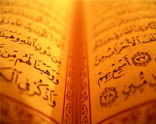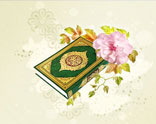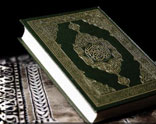The Demand of the Qur'an for a Direct Confrontation
The Noble Qur'an was revealed in the Arabic language, one of the richest languages in the world from the point of view of firmness of structure and abundance of vocabulary. It descended like a flash of lightning in the darkness of the Age of Ignorance, and in the manner in which it conveyed various types of subject matter in the most concise of sentences it had nothing in common with the conventional language of the Arabs. At the time that the Qur'an was revealed, the literary talent and eloquence of the Arabs was at its peak. Works created by poets and orators commanded the attention and admiration of everyone, and literature constituted the only art cultivated by the Arab elite.
The Qur'an, which constituted the documentary proof of the messengerhood of the Prophet of Islam and the raw materials of which its constituent letters and words was revealed over a period of twenty-three years in accordance with the particular needs that emerged over time. Thus it guided the Prophet and his companions step by step toward their exalted goals. The words and expressions of the Qur'an are harmonious and its words are set together pleasingly and with the utmost beauty, and in complete accord with the subtle meanings they express. This unique combination of wording and meaning is a special feature of the Qur'an and another aspect of its miraculousness.
With the revelation of the Qur'an, the Arabs made the acquaintance of a fresh and new form of speech which was neither prose nor poetry, but the melody of which was more beautiful and attractive than that of poetry and the discourse of which was more eloquent and effective than that of prose. Whoever heard it was drawn toward it and transformed by it. It was utterly different from all forms of human speech by virtue of the superiority of its concepts, the eloquence of its style and outward form, and its exposition of meanings in the most concise way.
The firm laws and clear logic of the Qur'an showed human beings the way to correct religion and living, and inspired them with the determination to create an epic unparalleled in history. The Qur'an destroyed utterly the superstitions that the oppressors and their helpers had elaborated throughout history.
The Qur'an established a mode of thought leading to the truth, which is identified as thought that eschews all obstinacy, caprice and fanaticism. From the very first day that the Prophet began preaching his message of monotheism, he summoned people also to a realistic vision of the world. When inviting them to faith, he addressed their wisdom and intelligence and called on them to use their eyes and their ears to perceive the truth. He unshackled them from custom and usage, from obstinately clinging to ancient heritages, and strove to convince them that they should not perversely insist on retaining the beliefs and loyalties that had been born of polytheism. Although these efforts earned him bitter harassment, he was not dismayed, and he did not give up before fulfilling the role that the Creator had given him in improving men's lives. Many of the polytheists did not permit themselves to listen to the Qur'an for they were well aware of its remarkable effect and afraid that its profound and astonishing influence might conquer their hearts as well, drawing them ineluctably towards it.
Ibn Hisham writes in his life of the Prophet:
So strong was the heartfelt desire of the people to hear the Quran that even some of the unbelievers of the Quraysh would stealthily go near the Prophet's house at night, remaining there until dawn, in order to listen throughout the night to the pleasing melody of the Qur'an as recited by the Messenger of God. This happened many times.
When the revelation of the Qur'an began, the Most Noble Messenger clearly proclaimed the Qur'an to be the Word of God, and said it was impossible for any human being to duplicate it; if anyone disagreed, he ought to make an attempt to copy it, and should feel free to seek help from any source in doing so. None was able to take up this challenge and produce even a short surah similar to the Qur'an.
Still more remarkable is the fact that the utterances of the Prophet, whose tongue would recite the Qur'an, bore no resemblance whatsoever to the Qur'an. This is in itself a convincing proof that the Qur'an originated from a source other than the mind of the Prophet.
The Qur'an Modifies the Conditions of its Challenge
The Quran issued a challenge not only to the contemporaries of the Prophet but also to men in all ages. In order to demonstrate the incapacity and impotence of people to imitate it, it issued the following universal proclamation:
﴾Were all of mankind to come together and wish to produce the like of the Qur'an, they would never succeed, however much they aided each other﴿. (17:88)
It then modifies the challenge and reduces its scope by saying:
﴾Do people imagine that this Qur'an is not from Us, and that you, Oh Prophet, are falsely attributing it to Us? Tell them that if they are speaking truly they should produce ten surahs resembling the Qur'an, and that they are free to call on the aid of anyone but God in so doing﴿. (11:13)
Then, at a third stage, the scope of the challenge is reduced still further: the deniers are called on to produce only a single surah resembling the Qur'an:
﴾Oh people, if you doubt the heavenly origin of this Book which We have sent down to Our servant, the Prophet, produce one surah like it﴿. (2:23)
Since we know that some of the shorter surahs consist only of a few brief sentences, this final challenge constituted a definitive proof of the human being's inability to imitate the Qur'an. It is remarkable that the Prophet who thus challenged the Arabs to a kind of literary contest, despite all their literary resources, was someone who had never in the course of the forty years of his life participated in any of their literary competitions or acquired any superiority in eloquence over this own people. Let us not forget that this challenge was issued to a people whose leaders were threatened by the devastating attacks of the Qur'an, their lives, their property, their ancient customs, their ancestors, their whole social position. If it had been at all possible for the Arabs to respond to the challenge of the Quran, they would have taken it up immediately, with the unstinting aid of the masters of eloquence that were by no means rare in that age. Thus they would have invalidated the proofs of the Qur'an and won an everlasting victory.
Furthermore, as a matter of general principle, if one consistently follows and studies the style of a certain form of speech, he will ultimately be able to imitate it. But the Qur'an forms an exception to this rule: however much one tries to practice the use of the Qur'anic style, he will never be able to create something resembling the Qur'an. This reveals to us a significant truth: mere learning and study can never give us the capability to imitate the Qur'an. History has not a single instance to show in which this particular aspect of the miraculousness of the Qur'an has been negated; it cannot point to a single book comparable to the Qur'an.
Even among the speeches and sayings of the Prophet, nothing can be found which resembles the Qur'an from the point of view of style and eloquence. If the forces opposing Islam, with all of their skilled rhetoricians, had been able to create works capable of competing with the Qur'an, there would have been no need for them to endure losses and casualties by going to war, to suffer hardship and expend material resources. They could have won an easy victory by means of propaganda, a kind of cold war, and put paid to the rise of Islam within itself, its place of origin.
They called into play all their resources in an effort to meet the challenge of the Qur'an, but all their efforts came to naught. They were unable to point even to a single error or defect in the Qur'an and were obliged to admit that its words were situated on a higher plane than the thought and speech of the human being. The verses of the Qur'an penetrated the depths of human beings' hearts with such unprecedented swiftness that all people of sound mind and heroic disposition eagerly embraced its message.
By contrast, the devotees of ignorance and mental stagnation, people who assigned little value to wisdom and thought, and whose lives were spent in the swamp of neglect and lack of awareness, were the principal element in opposing Islam and urging others to do so. In order to conceal from people's view the miraculous nature of the Qur'an, they attributed the Qur'an to the workings of magic, seeking thus to explain the extraordinary attraction exerted by its verses and its unique influence. Sometimes they would also subject the converts to Islam to harassment and a hail of contempt and ridicule, or through force and coercion they would attempt to prevent the people from thinking freely. Their whole method of struggle against Islam was, in fact, childish, and it betrayed their weakness and utter helplessness.
For example, they instructed a group of people to go and make a noise, to whistle and clap their hands, while the Prophet was reciting the verses of the Qur'an, so that the people would not fall under the influence of its eloquence and power to attract. The methods followed by the leaders of Quraysh and their insistence on preventing the message of the Qur'an from reaching the ears of the people showed that a deadly serious struggle between truth and falsehood was not indeed underway. The Qur'an itself unmasks the methods they followed and the negative role that they played:
The polytheists said: ﴾Do not listen to the verses of the Quran, and make a noise while they are being recited; perhaps you will thus triumph.﴿ (41:26)
But this attempt forcibly to sever the connection between people's minds and the Qur'an did not last long. As soon as the shackles of coercion and fear were loosened from the minds of people, even some of the leaders of the polytheists who were firmly attached to the rites and customs of the Age of Ignorance would conceal themselves behind the coverings of the Ka'bah not far from where the Prophet was sitting, in order to listen to him reciting the verses of the Qur'an in prayer. This shows how deeply the image the Qur'an had traced of itself was able to penetrate deep into the souls of the people, so that the polytheists were ultimately unable to accomplish anything effective against the message of the Qur'an, although it represented a call to battle fatal to their interests. This impotence on the part of the enemies of Islam belongs to the dawn of Islam: the masters of eloquence were unable to imitate or compete with the Qur'an.
Now that we are in the fifteenth century since the Qur'an first laid down its challenge, a time when the progress of learning has opened up new horizons of thought in front of us, we can appreciate the Divine origin of the Qur'an and its infinite values by reference to other matters, quite apart from the unique and inimitable structure and eloquence of the Qur'an. We can perceive the Qur'an to be an everlasting miracle, because the position of revelation vis-a-vis its deniers remains firmly the same, and the challenge of the Qur'an still resounds to all of mankind:
﴾If you doubt the heavenly origin of this book, produce one surah like it﴿. (2:23)
Can the person of today take up the challenge of the Qur'an and produce a surah like it, thereby conquering the stronghold of Islam and invalidating the claims of its Prophet? Both in past and present times, there have been obstinate and impudent enemies of Islam among the experts on Arabic language and literature. If it had been possible for them to meet the challenge of the Qur'an, that eternal miracle of harmony and symmetry, and produce a single surah like it, they would certainly have devoted themselves fully to such a destructive undertaking.
Islam has proposed, then, a very simple challenge to those who oppose it. Why then do the deniers of prophethood choose roundabout ways, avoiding this direct method of confronting and defeating Islam? Is it not because the door is firmly closed on meeting the challenge posed by the Qur'an?
Gibb, a certain Christian scholar, says:
Even if we attempt to reorder the words of the Quran, we will not be able to put them in a new and meaningful order; we must replace them exactly where they were before.
Despite the passage of time, historical documents and evidence still provide such a clear picture of the Prophet of Islam and his characteristics that all historians are unanimous that the Prophet was an unlettered man who had never known books or teachers and never learned how to write. The Qur'an itself addressed him as follows, proclaiming his characteristics to the members of Meccan society who were acquainted with all the stages of his life:
﴾Before this, you did not read any book, nor did you write anything with your hands.﴿ (29:48)
The Divine nature of the Prophets message is thus demonstrated. Is it at all possible that someone should proclaim to the members of his own society, in utter contradiction of the truth, that he is unlettered and has never studied, without anyone voicing an objection? The dark cultural environment of that day was, in any event, a stranger to scholars and teachers; nothing existed that the Prophet might have studied. Those people who knew how to read and write were few and far between and none of the historians records a single instance of the Prophet having read a single line or written a single word before the beginning of his prophetic mission.
How remarkable it is that such a man who had never studied became the standard-bearer of a movement calling for science and free thought! With the beginning of his messengerhood and his entry on the stage of human history, mankind entered a new stage of progress. With the suddenness of a flash of lightening, he introduced his people to the world of learning and writing and laid the foundations of a movement that transformed the degenerate society of Arabia into the nucleus of a great world civilization. A few centuries later, that civilization could boast of the most splendid scientific accomplishments and the greatest scholars and researchers.
A consideration of these facts concerning the phenomenon of Islam, particularly as they are judged by non-Muslim scholars, helps us to understand better the profoundly miraculous nature of the Qur'an. The author of Muhammad, the Prophet Who Must Be Examined Anew, writes as follows:
Although he was unlettered, the very first verses that were revealed to him contain mention of the pen and of knowledge, of learning and teaching. There is no other religion that places such emphasis, in its very origin, on knowledge and learning.
If Muhammad had been a scholar, the revelation of the Qur'an in the cave of Hira would not have been surprising, for a scholar knows well the value of learning. But he was unlettered and had never studied with any teacher. I congratulate the Muslims that the acquisition of knowledge was so highly valued at the very inception of their religion.
Laura Vaccia Vaglieri, professor at the University of Naples, has the following to say:
The heavenly book of Islam is miraculous and inimitable. Its style is totally unprecedented in Arabic literature, and its peculiar impact on the spirit of the human being derives from its special and superior characteristics. How is it possible that such a book should be the work of Muhammad, an Arab who had never studied?
We find in this book a treasury of knowledge beyond the capacity of the greatest philosophers and statesmen, and for this reason it is also impossible to regard the Qur'an as the work of an educated person.
Smith writes in his book, Muhammad and Islam:
I boldly assert that one day the loftiest of human philosophers and the most veracious principles of Christianity will confess and bear witness that the Quran is the Word of God and that Muhammad is the Messenger of God. An unlettered and unlearned Prophet was chosen by God to bring the Quran to mankind, a book that has in the course of history produced thousands of other books and treatises, brought libraries into being and filled them with books, and placed before mankind laws and philosophies and educational, intellectual and ideological systems.
He arose in an environment where there was no trace of learning and civilization. In the whole of Medina, there were only eleven people who knew how to read and write, and in all the branches of the Quraysh, in Mecca and its environs, not more than seventeen people were literate.
The teachings of the Qur'an, which mentions knowledge and the pen in its opening verses, brought about a tremendous transformation. Islam proclaimed study to be a religious duty, and made the black ink of the scribe and the scholar to be superior to the red blood of the martyr.
Thanks to the teachings of the Qur'an and its emphasis on the cultivation of knowledge, countless scholars made their appearance and wrote innumerable books. Different scientific disciplines were derived from the Qur'an and spread across the world by Muslim thinkers. The world was illumined with the light of the Qur'an and the culture of Islam.
* By Seyyed Mujtaba Musavi Lari.



















